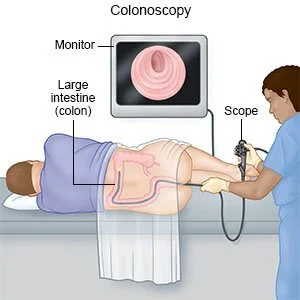NY Times and New Yorker Exaggerate Cancer Screening Benefits
There is no evidence that colonoscopy, depicted here, or other popular screening methods save lives.
HOBOKEN, JULY 8, 2025. The New York Times and New Yorker recently published articles on cancer screening. Both warn that screening asymptomatic people can have harmful consequences. And yet both overstate the benefits of certain types of screening, because both accept a flawed method for evaluating screening.
On July 2, The Times published “Here’s What You Need to Know About Cancer Screening.” Reporter Simar Bajaj says studies have not established the benefits of screening for many kinds of cancer, including skin, oral, bladder, ovarian, pancreatic, testicular, thyroid and prostate cancer. In these cases, screening “can lead to too many false positives and complications without reducing people’s risk of death.”
But Bajaj claims “regular screening” for lung, breast, colorectal and cervical cancer “can save lives without exposing too many people to false alarms, additional testing or unnecessary treatments.”
If you read Bajar carefully, you realize he is saying that screening for these four specific cancers can reduce your risk of dying from that cancer. This outcome is called disease-specific mortality.
That brings me to “The Catch in Catching Cancer Early,” in the June 23 New Yorker. Siddhartha Mukherjee, an oncologist and author of Emperor of All Maladies, a history of cancer medicine, warns that cancer screening can lead to false positives and overdiagnosis, the flagging of tumors and other anomalies that, if left alone, would never have harmed patients. The result is “unnecessary procedures, anxiety and harm.”
Like Bajaj, Mukherjee says you should evaluate a screening method by looking at disease-specific mortality. You compare a screened group to an unscreened group and ask, “Did fewer people die of cancer in the screened group?”
Mukherjee singles out one screening method—colonoscopy--that has passed this test. In 2022, he says, a “landmark colonoscopy trial” called NordICC found a “fifty-per-cent reduction in deaths associated with colorectal cancer among those who received colonoscopies.”
Wow, 50 percent, that sounds great. Why, then, did an editorial in The New England Journal of Medicine, which published the NordICC study, call its results “disappointing”? Because, as I explain in a 2023 column, the NordICC trial did not find that colonoscopy significantly reduces all-cause mortality, death for any reason.
Here’s the problem with disease-specific mortality: it does not capture all the harms resulting from cancer tests and treatments. For example, colonoscopy can cause perforation of the colon, and complications from surgery for colorectal cancer might lead to premature death. Similarly, a woman overdiagnosed with breast cancer might die of heart disease or lung cancer, which are side effects of radiation treatment.
To capture potentially deadly consequences of cancer screening, you need to measure all-cause mortality. A large, long-running trial of mammography has shown that screening results in slightly increased death rates. That’s why some experts have called for mammography screening “to be abandoned.”
A 2016 meta-analysis of cancer-screening trials found that “none showed reductions in overall mortality.” A 2023 meta-analysis concluded that “current evidence does not substantiate the claim that common cancer screening tests save lives by extending lifetime, except possibly for colorectal cancer screening with sigmoidoscopy.” Sigmoidoscopy is a cheaper, less intrusive alternative to colonoscopy.
Just to be clear, these meta-analyses contradict Mukherjee’s assertion that colonoscopy is a “success” and Bajaj’s claim that screening for lung, breast and cervical cancer “saves lives.” Of course, screening makes more sense for smokers, people with a family history of cancer and others with risk factors.
I applaud Bajaj and Mukherjee for pointing out the downsides of screening, which can lead to unnecessary, costly, potentially deadly treatment. I just wish they would re-consider whether colonoscopies or any other screening methods actually “save lives.”
Further Reading:
I go more deeply into the downside of cancer screening in these columns:
Mammography Screening Is a Failed Experiment
Do Colonoscopies Really Save Lives?
The Cancer Industry: Hype Versus Reality


